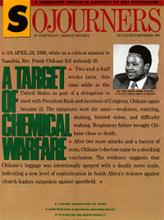The scribes and Pharisees brought a woman along who had been caught committing adultery; and making her stand there in full view of everybody, they said to Jesus, "Master, this woman was caught in the very act of committing adultery, and Moses has ordered us in the Law to condemn women like this to death by stoning. What have you to say?" They asked him this as a test, looking for something to use against him. But Jesus bent down and started writing on the ground with his finger. As they persisted with their question, he looked up and said, "If there is one of you who has not sinned, let him be the first to throw a stone at her." Then he bent down and wrote on the ground again. When they heard this, they went away one by one ...
-- John 8:3-9
THE GOSPEL EXPLAINS IT all. Capital punishment was the rule of the land. Everyone was in on it. Death held final sway over the poor and the rebellious. If Jesus was to speak for love of life, at some point he had to speak against their love of death.
The religious men of his time brought to Jesus a woman whom they were going to stone to death, legally, for committing the crime of adultery. Her male companion, who also would have committed the adultery, was not to be killed; he was not even brought forward. When Jesus was pressed for his opinion, as they were about to stone her, he began to trace on the ground.
What he traced there has boggled the thoughtful for centuries. But it is not so much what he traced that matters but the fact that he stopped to trace on the ground at all. His calm, childlike response must have taken the scribes and Pharisees totally by surprise. It changed the center of their attention from their fury and anger to his scribbling on the ground. Once he had their attention, once they were listening and trying to figure out what he was doing, then he proceeded to give an answer, knowing they could hear it and a life might be saved.
Read the Full Article

